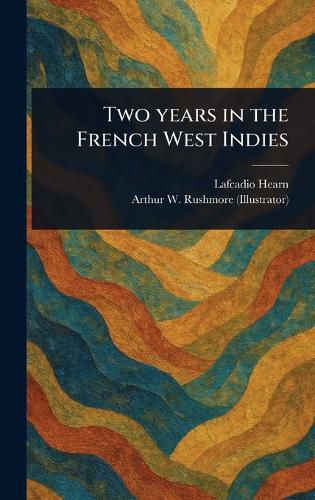Readings Newsletter
Become a Readings Member to make your shopping experience even easier.
Sign in or sign up for free!
You’re not far away from qualifying for FREE standard shipping within Australia
You’ve qualified for FREE standard shipping within Australia
The cart is loading…






This title is printed to order. This book may have been self-published. If so, we cannot guarantee the quality of the content. In the main most books will have gone through the editing process however some may not. We therefore suggest that you be aware of this before ordering this book. If in doubt check either the author or publisher’s details as we are unable to accept any returns unless they are faulty. Please contact us if you have any questions.
"Two Years in the French West Indies" offers a captivating glimpse into nineteenth-century Martinique through the eyes of Lafcadio Hearn. More than just a travelogue, this book presents a rich tapestry of cultural observation, meticulously detailing the lives, customs, and landscapes of the French West Indies. Hearn's keen insights and evocative prose paint a vivid picture of a bygone era, making this a valuable historical document and an engaging read for anyone interested in the Caribbean.
Experience Martinique as it was, through the perceptive lens of a master storyteller. Hearn's work provides a unique window into the region's history and offers enduring insights into human nature and cultural exchange. A timeless exploration, this volume is a treasure for those seeking to understand the history and charm of the Caribbean.
This work has been selected by scholars as being culturally important, and is part of the knowledge base of civilization as we know it.
This work is in the public domain in the United States of America, and possibly other nations. Within the United States, you may freely copy and distribute this work, as no entity (individual or corporate) has a copyright on the body of the work.
Scholars believe, and we concur, that this work is important enough to be preserved, reproduced, and made generally available to the public. We appreciate your support of the preservation process, and thank you for being an important part of keeping this knowledge alive and relevant.
$9.00 standard shipping within Australia
FREE standard shipping within Australia for orders over $100.00
Express & International shipping calculated at checkout
Stock availability can be subject to change without notice. We recommend calling the shop or contacting our online team to check availability of low stock items. Please see our Shopping Online page for more details.
This title is printed to order. This book may have been self-published. If so, we cannot guarantee the quality of the content. In the main most books will have gone through the editing process however some may not. We therefore suggest that you be aware of this before ordering this book. If in doubt check either the author or publisher’s details as we are unable to accept any returns unless they are faulty. Please contact us if you have any questions.
"Two Years in the French West Indies" offers a captivating glimpse into nineteenth-century Martinique through the eyes of Lafcadio Hearn. More than just a travelogue, this book presents a rich tapestry of cultural observation, meticulously detailing the lives, customs, and landscapes of the French West Indies. Hearn's keen insights and evocative prose paint a vivid picture of a bygone era, making this a valuable historical document and an engaging read for anyone interested in the Caribbean.
Experience Martinique as it was, through the perceptive lens of a master storyteller. Hearn's work provides a unique window into the region's history and offers enduring insights into human nature and cultural exchange. A timeless exploration, this volume is a treasure for those seeking to understand the history and charm of the Caribbean.
This work has been selected by scholars as being culturally important, and is part of the knowledge base of civilization as we know it.
This work is in the public domain in the United States of America, and possibly other nations. Within the United States, you may freely copy and distribute this work, as no entity (individual or corporate) has a copyright on the body of the work.
Scholars believe, and we concur, that this work is important enough to be preserved, reproduced, and made generally available to the public. We appreciate your support of the preservation process, and thank you for being an important part of keeping this knowledge alive and relevant.